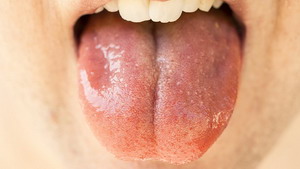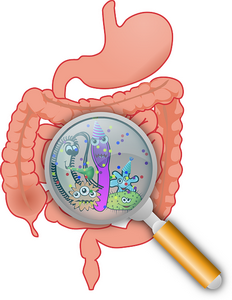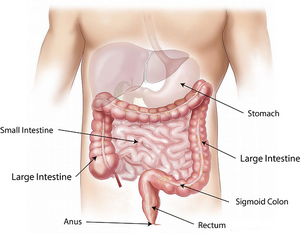 Most of us have had the experience of getting all stressed out and having that stress upset our stomach or gut. It might make us get all bloated, or produce acid indigestion, or maybe actual nausea. This might last a couple of hours or affect us all night long. What we may be missing is how common this is on a smaller scale and how much it affects our health even though we don’t notice the smaller level of response. Understanding what is happening and what we can do about it gives us a new set of tools for health we can use to enhance our lives and help us live longer and healthier.
Most of us have had the experience of getting all stressed out and having that stress upset our stomach or gut. It might make us get all bloated, or produce acid indigestion, or maybe actual nausea. This might last a couple of hours or affect us all night long. What we may be missing is how common this is on a smaller scale and how much it affects our health even though we don’t notice the smaller level of response. Understanding what is happening and what we can do about it gives us a new set of tools for health we can use to enhance our lives and help us live longer and healthier.
 On a biochemical level, stress mostly breaks down to two main processes – the impact of the stress hormone cortisol, and the impact of the imbalance between the sympathetic and parasympathetic nervous systems. Excess cortisol production in response to stress tends to mess up our immune function, mess with hormone production and central brain function, and consequently screw up our metabolism. Increased sympathetic (fight or flight) nerve activity shuts down our parasympathetic (relax and digest) nervous system. These two halves of the nervous system act like they are on a teeter-totter – when one is up the other is down and vice versa. A shutdown of the parasympathetic nervous system reduces blood flow to the gut, shuts down GI hormones and digestive system secretions, and alters the nerve function controlling gut functions like motility and what not. Let’s run a top-down explanation of stress’s impact on digestion.
On a biochemical level, stress mostly breaks down to two main processes – the impact of the stress hormone cortisol, and the impact of the imbalance between the sympathetic and parasympathetic nervous systems. Excess cortisol production in response to stress tends to mess up our immune function, mess with hormone production and central brain function, and consequently screw up our metabolism. Increased sympathetic (fight or flight) nerve activity shuts down our parasympathetic (relax and digest) nervous system. These two halves of the nervous system act like they are on a teeter-totter – when one is up the other is down and vice versa. A shutdown of the parasympathetic nervous system reduces blood flow to the gut, shuts down GI hormones and digestive system secretions, and alters the nerve function controlling gut functions like motility and what not. Let’s run a top-down explanation of stress’s impact on digestion.
 Starting in the mouth, stress alters our saliva to reduce the enzymes for breaking down carbohydrates as well as decreasing the antibody secretion in saliva that protect us from infection from bacteria in the food. Next, we see the effect on our esophagus. Stress tightens up the smooth muscles of the food tube making it more difficult to get food swallowed down. It can get stuck in the throat causing it to stick like a lump in the throat. The tightening causes the esophagus to get shorter which pulls up on the throat so much that it can pull the attachment at the stomach up into the chest cavity causing the cardiac or esophageal sphincter to not close properly. This allows stomach acid to wash up into the esophagus causing heartburn. This is the real cause of so-called stomach acid reflux. Reflux is not about too much stomach acid.
Starting in the mouth, stress alters our saliva to reduce the enzymes for breaking down carbohydrates as well as decreasing the antibody secretion in saliva that protect us from infection from bacteria in the food. Next, we see the effect on our esophagus. Stress tightens up the smooth muscles of the food tube making it more difficult to get food swallowed down. It can get stuck in the throat causing it to stick like a lump in the throat. The tightening causes the esophagus to get shorter which pulls up on the throat so much that it can pull the attachment at the stomach up into the chest cavity causing the cardiac or esophageal sphincter to not close properly. This allows stomach acid to wash up into the esophagus causing heartburn. This is the real cause of so-called stomach acid reflux. Reflux is not about too much stomach acid.
 What about the stomach itself? How does stress affect the stomach? Stress changes how the stomach muscles act and affects the digestive juice secretions into the stomach. Food tends to sit too long in the stomach because stress shunts blood flow away from the stomach and out to the muscles for action-based movement. This can make you feel overly full and even a bit nauseous. Protective mucus secretions decrease which can allow the strong acid in the stomach to burn the lining. Consequently, the stomach decreases acid production, which compromises the first stage of digestion for unfolding proteins so enzymes can break them down. Lower acid production also fails to ionize minerals, a necessary step to allow them to be absorbed further down in the gut. Stress also decreases pepsin enzyme production as well as lowering the release of intrinsic factors; the co-factor required for us to be able to absorb vitamin B12. Without B12 you develop pernicious anemia and neurological problems. Chronic stress really messes us up.
What about the stomach itself? How does stress affect the stomach? Stress changes how the stomach muscles act and affects the digestive juice secretions into the stomach. Food tends to sit too long in the stomach because stress shunts blood flow away from the stomach and out to the muscles for action-based movement. This can make you feel overly full and even a bit nauseous. Protective mucus secretions decrease which can allow the strong acid in the stomach to burn the lining. Consequently, the stomach decreases acid production, which compromises the first stage of digestion for unfolding proteins so enzymes can break them down. Lower acid production also fails to ionize minerals, a necessary step to allow them to be absorbed further down in the gut. Stress also decreases pepsin enzyme production as well as lowering the release of intrinsic factors; the co-factor required for us to be able to absorb vitamin B12. Without B12 you develop pernicious anemia and neurological problems. Chronic stress really messes us up.
 From the stomach, the food next passes down into the duodenum, the first 12 inches of the small intestine. Here the pancreas and the liver/gallbladder are supposed to do their jobs. The pancreas is supposed to secrete bicarbonate to neutralize the acid from the stomach that got mixed into the food. The pancreas also dumps a load of all sorts of digestive enzymes into the food to break down the food into its basic parts. Stress reduces pancreas outflow leading to maldigestion and possible malnutrition. At the same site, the gallbladder is supposed to dump bile salts into the food to break up fat globules into tiny emulsified particles so they can be absorbed. Again, stress shuts this down to some degree. Generally, the result is foul-smelling gas passing through the system. Bile also contains the color that makes bowel movements dark brown. When your stools are light brown or there are bits of fat in the stool or they float, it means your gallbladder is not working right. Since vitamins A, D, E, and K are all fat-soluble, your gallbladder has to be working right for us to get these vitamins from our food or even from pills into our body.
From the stomach, the food next passes down into the duodenum, the first 12 inches of the small intestine. Here the pancreas and the liver/gallbladder are supposed to do their jobs. The pancreas is supposed to secrete bicarbonate to neutralize the acid from the stomach that got mixed into the food. The pancreas also dumps a load of all sorts of digestive enzymes into the food to break down the food into its basic parts. Stress reduces pancreas outflow leading to maldigestion and possible malnutrition. At the same site, the gallbladder is supposed to dump bile salts into the food to break up fat globules into tiny emulsified particles so they can be absorbed. Again, stress shuts this down to some degree. Generally, the result is foul-smelling gas passing through the system. Bile also contains the color that makes bowel movements dark brown. When your stools are light brown or there are bits of fat in the stool or they float, it means your gallbladder is not working right. Since vitamins A, D, E, and K are all fat-soluble, your gallbladder has to be working right for us to get these vitamins from our food or even from pills into our body.
 From here the food moves down into the rest of the small intestine. The failure of the salivary gland enzymes at the mouth, the acid and enzymes in the stomach, and the lack of bile and pancreatic enzymes and acid-neutralizing bicarbonate now play out in the intestine. The food lump, called a bolus, now moves through twenty feet or so of the intestine. The high acidity burns the small intestine and the undigested proteins and other foods can not be absorbed properly into the bloodstream to provide us the nutrition we are seeking. If this happens chronically the intestine lining gets damaged and large undigested proteins break through the one-cell thick small intestine lining triggering allergic and immune-inflammatory reactions. These large food particles are perceived as attackers to the body and we form antibodies to these foods that should be normal good foods for us making us sensitive to these foods. But when they are in the wrong place, the bloodstream, they are enemies. The bloodstream carries these food enemies all over the body causing inflammation all over the place. The holes these foods create also let all sorts of toxic chemicals and bacterial components into our bloodstream, wreaking havoc on our immune system and virtually every organ, nerve, and muscle system we have.
From here the food moves down into the rest of the small intestine. The failure of the salivary gland enzymes at the mouth, the acid and enzymes in the stomach, and the lack of bile and pancreatic enzymes and acid-neutralizing bicarbonate now play out in the intestine. The food lump, called a bolus, now moves through twenty feet or so of the intestine. The high acidity burns the small intestine and the undigested proteins and other foods can not be absorbed properly into the bloodstream to provide us the nutrition we are seeking. If this happens chronically the intestine lining gets damaged and large undigested proteins break through the one-cell thick small intestine lining triggering allergic and immune-inflammatory reactions. These large food particles are perceived as attackers to the body and we form antibodies to these foods that should be normal good foods for us making us sensitive to these foods. But when they are in the wrong place, the bloodstream, they are enemies. The bloodstream carries these food enemies all over the body causing inflammation all over the place. The holes these foods create also let all sorts of toxic chemicals and bacterial components into our bloodstream, wreaking havoc on our immune system and virtually every organ, nerve, and muscle system we have.
 As this mess finally makes it down into the colon, all these improperly digested and undigested foods feed all sorts of unhealthful bacteria. We develop a ghetto gut full of inflammation-causing bacteria. This ghetto growth of bacteria forms all kinds of chemical messengers that pass backward up the Vagus nerve from the colon to the brain. Here it triggers brain inflammation that ultimately is responsible for such things as Alzheimer’s, Parkinson’s, tremors, bad moods, and all sorts of other bad consequences. Your brain can get as inflamed as after you have a concussion, just from chronic stress affecting your gut. Chronic stress is a bad thing for your health. Humans actually thrive on challenges and little bits of stress that promote us to rise to meet the challenges. But constant chronic stress is out to kill us slowly and painfully.
As this mess finally makes it down into the colon, all these improperly digested and undigested foods feed all sorts of unhealthful bacteria. We develop a ghetto gut full of inflammation-causing bacteria. This ghetto growth of bacteria forms all kinds of chemical messengers that pass backward up the Vagus nerve from the colon to the brain. Here it triggers brain inflammation that ultimately is responsible for such things as Alzheimer’s, Parkinson’s, tremors, bad moods, and all sorts of other bad consequences. Your brain can get as inflamed as after you have a concussion, just from chronic stress affecting your gut. Chronic stress is a bad thing for your health. Humans actually thrive on challenges and little bits of stress that promote us to rise to meet the challenges. But constant chronic stress is out to kill us slowly and painfully.
 Unfortunately, I see way too many people living under this kind of stress. They believe that the price for getting out from under this stress is too high. But I would argue that they are just not aware of the toll it is taking on their health. And if you don’t have health, you don’t have anything. Nothing else matters more in the long run. We live these lies that say something like “If I just had ________, then I would be okay, everything would be fine.” Once your basic survival needs are met – enough food, water, shelter, clothing, and safety from immediate harm, your external “needs” are met for being okay. Beyond that, nothing outside yourself can make you okay. No amount of money, recognition, attention, power, control, anything external makes you okay. Once you are past physical survival, feeling okay is entirely an inside job. Okayness comes from you loving and respecting you. We want all sorts of outside things that would feel exciting or relaxing or whatever, but they can not fill that basic sense of “I am okay.” Stressing yourself out chasing those outside things is not worth it. Let it go. Find what fulfills you from the inside. That is what will support your health.
Unfortunately, I see way too many people living under this kind of stress. They believe that the price for getting out from under this stress is too high. But I would argue that they are just not aware of the toll it is taking on their health. And if you don’t have health, you don’t have anything. Nothing else matters more in the long run. We live these lies that say something like “If I just had ________, then I would be okay, everything would be fine.” Once your basic survival needs are met – enough food, water, shelter, clothing, and safety from immediate harm, your external “needs” are met for being okay. Beyond that, nothing outside yourself can make you okay. No amount of money, recognition, attention, power, control, anything external makes you okay. Once you are past physical survival, feeling okay is entirely an inside job. Okayness comes from you loving and respecting you. We want all sorts of outside things that would feel exciting or relaxing or whatever, but they can not fill that basic sense of “I am okay.” Stressing yourself out chasing those outside things is not worth it. Let it go. Find what fulfills you from the inside. That is what will support your health.
Take care,
David
